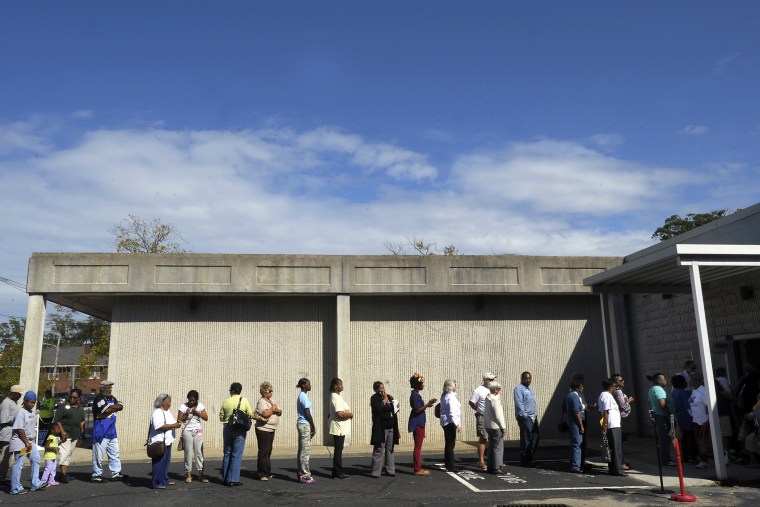The entirety of North Carolina’s sweeping voting law, seen by many as the strictest in the country, can go into effect for the impending midterm elections, the Supreme Court ordered Wednesday.
The Supreme Court’s move clears the way for the elimination of same-day voter registration and bans the counting of votes cast in the wrong precincts. An appeals court put a hold on those two provisions last week.
A trial on the voting law is scheduled for the summer of 2015.
The court did not explain its decision in the brief order it issued, and it wasn't clear how many justices made up the majority. Justices Sotomayor and Ginsburg dissented.
Nearly 100,000 voters—disproportionately minorities—took advantage of same-day registration in 2012. Experts say it's one of the most effective ways to bring new voters into the process.
The law also eliminated other measures that make voting easier, including a week of early voting and a program that allowed high school students to register to vote. Minorities are more likely than whites to use same-day registration, early voting, and pre-registration, according to evidence contained in briefs filed by the law’s challengers.
The law's voter ID measure does not go into effect until 2016. But the appeals court said the state could move ahead with its "soft rollout" of voter ID, in which poll workers are directed to ask voters whether they have ID but not stop them from voting if they don't.
“We are disappointed with the Supreme Court’s ruling today,” North Carolina NAACP head Rev. William Barber II said in a statement. “Tens of thousands of North Carolina voters, especially African-American voters, have relied on same-day registration, as well as the counting of ballots that were cast out of precinct, for years.
The law's approval is the latest result, and perhaps the most serious yet, of the Supreme Court's 2013 ruling in Shelby County v. Holder, in which it invalidated the strongest provision of the Voting Rights Act (VRA), Section 5. The provision had required that certain states get federal sign-off before changing their voting laws. North Carolina, most of which was covered under Section 5, moved ahead with its strict voting law in the wake of the Shelby ruling.
"Tens of thousands of North Carolina voters, especially African-American voters, have relied on same-day registration, as well as the counting of ballots that were cast out of precinct, for years. "'
In their dissent, Ginsburg and Sotomayor noted that the law "likely would not have survived" under Section 5.
Without Section 5, voting rights groups and the U.S. Justice Department challenged the law under a different provision of the VRA, Section 2, which bars racial discrimination in voting, and which has rarely been used to stop statewide laws like North Carolina's. Though Wednesday's order wasn't a ruling on the merits, it may suggest that the Supreme Court is likely to favor a narrow interpretation of Section 2, raising questions as to whether the VRA is strong enough to stop the wave of restrictive voting laws that have been passed by Republicans in recent years.
The Supreme Court's decision is good news for Republicans in the state, which is hosting a crucial Senate race this year. Republican Senate candidate Thom Tillis, who is running against Sen. Kay Hagan, played a key role in shepherding the law through the legislature last year as speaker of the state House. Hagan is counting on strong turnout from black voters and young voters, both of whom are likely to be disproportionately affected by the law.
The order is just the latest in a series of legal setbacks for those looking to protect voting rights. Last month, the Justices ordered, by a vote of 5-4, that Ohio's cuts to early voting could go into effect for the election. Those too had been challenged as racially discriminatory under the VRA.
And an appeals court on Monday upheld Wisconsin's voter ID law. The law's challengers have appealed to the Supreme Court to block it, arguing that putting the measure into effect so close to the election will cause needless confusion. A decision in that case is expected this week.
